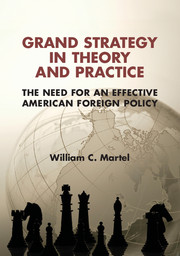Book contents
- Frontmatter
- Dedication
- Contents
- Acknowledgments
- 1 Introduction
- 2 Contemporary Classics in American Grand Strategy
- Part I Makers of Grand Strategy
- Part II Makers of American Grand Strategy
- 7 Building Domestic Foundations of American Power: Washington to Lincoln
- 8 Restraining Sources of Disorder: Theodore Roosevelt to Franklin Delano Roosevelt
- 9 Reinforcing Alliances and Partnerships: Truman to Reagan
- 10 Drifting between Principles: Bush to Obama
- Part III Conclusion
- Notes
- Index
7 - Building Domestic Foundations of American Power: Washington to Lincoln
Published online by Cambridge University Press: 05 January 2015
- Frontmatter
- Dedication
- Contents
- Acknowledgments
- 1 Introduction
- 2 Contemporary Classics in American Grand Strategy
- Part I Makers of Grand Strategy
- Part II Makers of American Grand Strategy
- 7 Building Domestic Foundations of American Power: Washington to Lincoln
- 8 Restraining Sources of Disorder: Theodore Roosevelt to Franklin Delano Roosevelt
- 9 Reinforcing Alliances and Partnerships: Truman to Reagan
- 10 Drifting between Principles: Bush to Obama
- Part III Conclusion
- Notes
- Index
Summary
This chapter examines American grand strategy from the nation’s founding to the Civil War. It illustrates how policies centered on building the domestic foundations of national power developed along three axes. First, America’s power grew throughout the nineteenth century due to a period of dramatic territorial expansion. Second, the federal government grew in its political power over the separate states to create a much more centralized yet still federalist system; it also built a modern, professional military in this period and created the capability of projecting power globally beyond its borders and its hemisphere. Third, the economic basis of American power grew tremendously in this period as the nation shifted from being primarily an agrarian economy to a modern, industrial economy. This chapter also examines the slavery issue through the lens of grand strategy. It was a fundamental domestic constraint that all of America’s leaders faced as they articulated and implemented the nation’s first grand strategies. Territorial expansion eventually disrupted the balance of power between slave and free states, to the point at which the Union could not hold, and a bloody civil war ensued.
The First Principle: Building Domestic Foundations of National Power
The first principle of American grand strategy is to build the domestic foundations of national power. This is the focus of this chapter, which covers the administrations of George Washington through Abraham Lincoln. To the three types of domestic power – political, military, and economic – discussed in Chapter 4, we now add a fourth, territory, which is the basic necessity for the building of the other three foundations of power.
- Type
- Chapter
- Information
- Grand Strategy in Theory and PracticeThe Need for an Effective American Foreign Policy, pp. 167 - 208Publisher: Cambridge University PressPrint publication year: 2015



